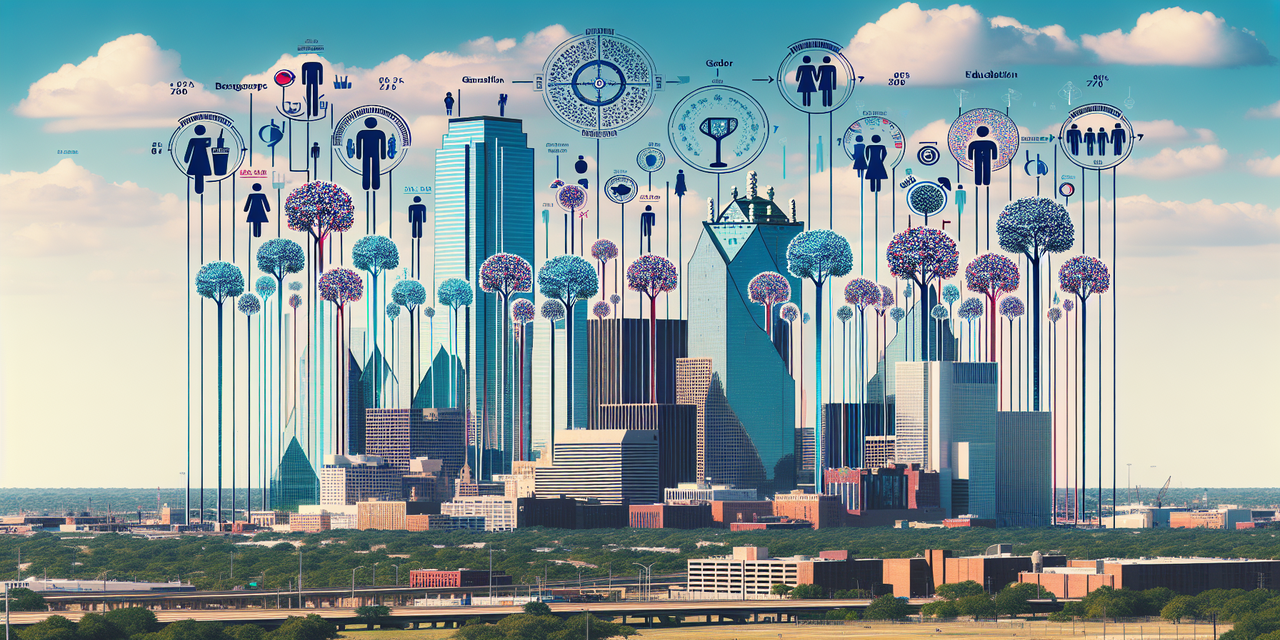Dallas Workforce Demographics for Bartender: Key Takeaways
- The median age of bartenders is in the early 30s, reflecting a youthful workforce in Dallas
- Approximately 60.5% of bartenders nationally are women, suggesting a female majority in Dallas as well
- Dallas bartenders show diverse educational attainment, with over 40% holding at least a bachelor’s or associate degree
The bartender workforce in Dallas, Texas, features a dynamic mix of age, gender, and education profiles.
This article explores these components to provide a clear demographic overview of bartenders in the area.
1. Age Demographics of Bartenders in Dallas
While city-specific age details for bartenders in Dallas are limited, national and local trends shed light on the likely age distribution.
The median age for bartenders nationwide stands at around 34 years for men and 30 years for women, indicating that many working in this profession are comparatively young adults.
Dallas itself has a median age of 33.1 years overall, which aligns closely with these bartender age estimates.
This suggests that the city's bartenders predominantly fall within their late 20s to mid-30s, a prime working age group for nightlife and hospitality roles.
Employers seeking to hire bartenders in Dallas can benefit from understanding these age-related workforce dynamics to better tailor their recruitment efforts. For a practical guide, see how to hire a bartender and bartenders for hire.
2. Gender Composition of Bartenders in Dallas
National data reveals that women make up approximately 60.5% of bartenders, while men comprise about 39.5%.
Although Dallas-specific gender data for bartenders is not explicitly available, the city’s hospitality market likely reflects similar patterns given national trends and Dallas's demographic makeup.
This female majority can be attributed to factors such as customer service skills and a strong presence of women in the service industry.
Understanding gender composition is key for employers to shape inclusive workplace policies and for workforce planning within Dallas's vibrant hospitality sector.
Hospitality employers may also find value in resources about women in leadership roles in hospitality and bartender interview questions to better support and hire female staff.
3. Educational Attainment Among Dallas Bartenders
Bartenders in Dallas display a broad spectrum of educational backgrounds, ranging from some high school to advanced degrees.
Specifically, approximately 33.2% have a high school diploma or GED, while a notable 27.6% hold a bachelor's degree.
Additionally, 15.3% possess an associate's degree, and 13% have completed vocational training or certification programs tailored to hospitality or bartending skills.
Smaller percentages include 4.7% holding a master's degree, 3.8% some college without completing a degree, 1.4% with some high school education, and about 0.9% possessing doctorate degrees.
This diversity reflects that bartending in Dallas attracts individuals from many educational backgrounds, encompassing those seeking entry-level roles as well as those with advanced academic credentials.
For bartenders looking to advance or employers interested in educational backgrounds, the how to become a bartender career overview might be useful.
4. Implications of Dallas Bartender Demographics
The youthful median age of bartenders underscores the importance of offering career development opportunities and flexible scheduling to engage younger employees effectively.
Gender composition, with a female majority, highlights the need for workplace policies attentive to gender equity and inclusivity within Dallas hospitality venues.
The varied educational profiles suggest potential for bartenders to progress into supervisory or management positions, especially those with higher education credentials.
Employers can leverage this diversity by offering targeted training programs and by fostering environments that encourage professional growth.
Insights on bartender performance reviews and retaining top hospitality staff can help employers improve retention.
5. Dallas Bartender Demographics in Context
Comparing Dallas’s bartender workforce to broader trends helps put the data in perspective.
The city’s median age aligns closely with national figures, emphasizing Dallas as a representative hospitality market.
The female dominance among bartenders matches national statistics seen across the United States, reflecting consistent gender trends in the industry.
Educational attainment in Dallas is notable for its comparatively high percentage of bartenders with college degrees, highlighting a market where the profession includes many well-educated individuals.
6. Leveraging Demographic Data for Dallas Employers
Dallas hospitality businesses can use these insights to tailor recruitment and retention strategies.
Targeting outreach efforts to younger candidates can help replenish the workforce and maintain a vibrant team.
Recognizing the female majority allows for thoughtful initiatives supporting women's career paths and promoting equity.
Offering continuing education and training opportunities can appeal to the significant segment with college-level education, aiding in employee satisfaction and minimizing turnover.
Employers interested in hiring guidance may want to consult how to hire a restaurant manager and restaurant staff hiring for general best practices in the hospitality industry.
7. Useful Government and Official Resources for Dallas Bartender Statistics
For those interested in detailed labor statistics or further research, the following authoritative sources provide valuable information:
- U.S. Bureau of Labor Statistics – Comprehensive data on employment statistics nationwide
- Texas Workforce Commission – State-specific workforce analysis and resources
- City of Dallas Official Website – Local government information and labor market reports
Dallas Workforce Demographics for Bartender: Conclusion
The bartender workforce in Dallas is predominantly young adults, with a female majority and a wide array of educational backgrounds ranging from high school diplomas to advanced degrees.
These demographics offer insights for employers to better understand their staffing, create targeted development programs, and foster inclusive work environments.
Utilizing official labor statistics and local government resources can aid businesses and policymakers in making informed decisions tailored to Dallas’s unique hospitality market.
Additional insights on bartender careers and hiring strategies can be found in the bartender industry events and bartender job description pages.

.png)

.png)
.jpg)